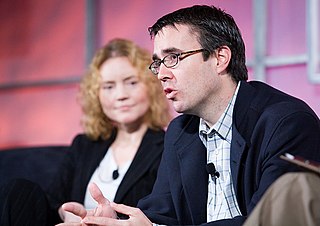A Quote by Jim Stengel
Consumers today are less responsive to traditional media. They are embracing new technologies that empower them with more control over how and when they are marketed to.
Quote Topics
Related Quotes
If old consumers were assumed to be passive, then new consumers are active. If old consumers were predictable and stayed where you told them, then new consumers are migratory, showing a declining loyalty to networks or media. If old consumers were isolated individuals, then new consumers are more socially connected. If the work of media consumers was once silent and invisible, then new consumers are now noisy and public.
I've talked about how the future of journalism will be a hybrid future where traditional media players embrace the ways of new media (including transparency, interactivity, and immediacy) and new media companies adopt the best practices of old media (including fairness, accuracy, and high-impact investigative journalism).
Years of research show us that the less control a person feels over an aversive stimuli coming at them, the more likely they are to disengage. Complete loss of control over a sustained period of time can actually lead to depression. It then follows that giving the person a level of control over the situation reduce the stress - and perhaps restore the disengagement.
Letting users control your site can be terrifying at first. From day one we were asking ourselves, "What is going to be on the front page today?" You have no idea what the system will produce. But stepping back and giving consumers control is what brought more and more people to the site. They have a sense of ownership and discovery at the same time. If you give users the tools to spread and share their interests with others, they will use them to promote what is important to them.
What a mistake to suppose that the passions are strongest in youth! The passions are not stronger, but the control over them is weaker! They are more easily excited, they are more violent and apparent; but they have less energy, less durability, less intense and concentrated power than in maturer life.
Our marvelous new information technologies boost our power and opportunities for political engagement, but they can also disempower us by contributing to extreme political mobilization that sometimes overwhelms our institutions. These institutions were designed for rural societies operation at a tiny fraction of today's speed and with a citizenry vastly less capable that today's. It's unclear how they will change to adapt to the new reality, but change they must.
If consumers weren't thinking this way, companies would be a lot less responsive. Right now, consumers don't really have a way to get information about where exactly their clothing is coming from - that's a barrier. We have labels on your eggs, "cage-free hens." They need to get something along those lines to allow the consumer to discriminate.
Digitization and new technologies are rapidly changing all industries, forcing them to prepare for a tomorrow that is unpredictable. This also applies to the industry of container shipping, ports, and logistics, which largely has been driven by the traditional business models focused on optimizing how you move goods.



































